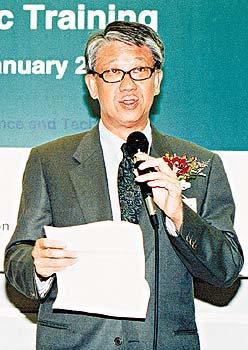Forensic course hones cyber Sherlocks
 DC & S Louis Lau opens the course |
A new course has seen the graduation of a group of officers specialising in the detection and gathering of electronic forensic evidence.
Cyber criminals will find it harder to cover their tracks as the course brought the group up-to-date with the latest cyber-crime trends and the methods to crack them.
The Commercial Crime Bureau's Computer Crime Section joined the Hong Kong University of Science and Technology and the Independent Commission Against Corruption to organise the Computer Crime Investigation and Computer Forensics Course, from January 7 to 25.
Eleven officers from Police, four from the ICAC, five from the Customs and Excise Department, two from Immigration and a Senior Government Counsel, took part.
Speakers included CCB Chief Inspector Hilton Chan and Senior Inspector Anthony Fung, along with Professor Sam Chanson, Dr Choy Man-hoi, Ricci Ieong and Albert Hui from the university, and some experts from overseas.
CIP Chan said the course was established as the Force had long anticipated the rise of electronic crime with the huge increase in Internet usage and the subsequent changes to social and economic infrastructure.
He said computer technology aids criminals through the communications provided by email and the Internet and the stealth of electronic encryption. "The emergence of the Internet has created a new dimension, with cyberspace being used for personal, social, cultural and economic activities which criminals can take advantage of, such as gambling, child pornography, information warfare, terrorism, extortion, email bombing, business fraud, and industrial espionage," CIP Chan said.
"Crimes are committed beyond geographical and jurisdictional boundaries and the culprits are not present at the crime scene, operating through remote access via various electronic communication media such as fibre optics or satellite and microwave transmission capabilities provided by internet service providers and wired or wireless telecommunication service carriers."
Mr Chan said the knowledge and skills of computer crime investigators and computer forensic examination were paramount for law enforcement to deal with digital evidence, such as digital signatures, electronic cash, bank and other financial records, electronic documents and watermarks, and the tracing of digital fingerprints and footprints of cyber criminals.
"People now don't just use the Internet and computers for information, but also financial transactions. However unlike hard copy, there are no physical signatures or fingerprints or witnesses to transactions so problems can arise. The course teaches officers how to find and analyse this electronic forensic evidence and make it presentable and understandable to the courts.
"Cyber criminals actually do leave behind a lot of trails and this type of forensics is almost just like examining fingerprints or fibres, however in a more complicated form involving data recovery and electronic search.
"So as computers have become part of our daily lives, investigators need to know the skills and knowledge to investigate and analyse digital evidence found in mobile phones, palm pilots, digital diaries, Notebook computers, emails, Internet chat services and electronic cash cards."
Director of Crime and Security Louis Lau Chun-sing officiated at the opening ceremony of the course.
More courses will be held during the year.
<< Back to Index >>